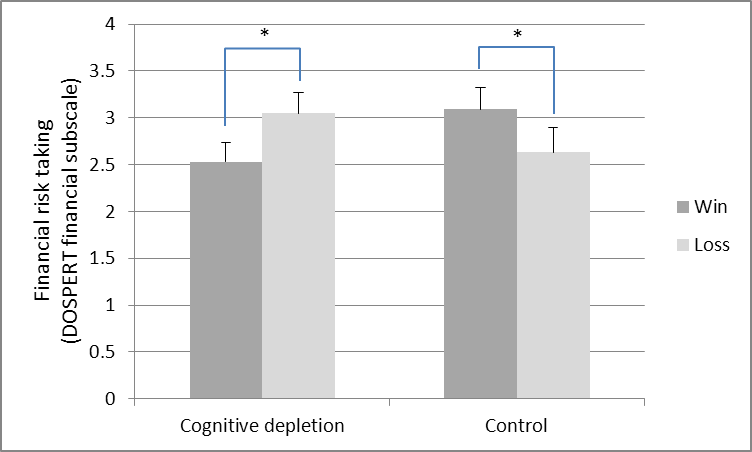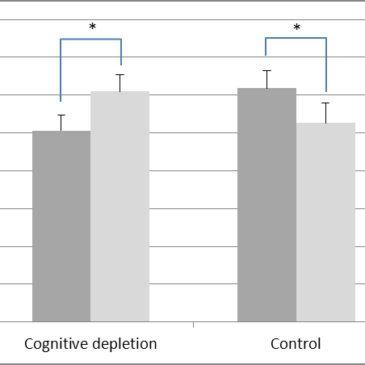Factors such as mental fatigue and the outcomes of previous bets might influence how we make decisions about risk. However, previous research reveals inconsistent findings about these factors. Being “cognitively-depleted”—in other words, being mentally fatigued—sometimes promotes riskier behavior and sometimes promotes more conservative decision making (Freeman & Muraven, 2010; Unger & Stahlberg, 2011). Likewise, it is unclear how the outcome of previous bets influences risky decisions (Demareee, Burns, DeDonno et al., 2012). This week’s WAGER reviews a study of the effects of both cognitive depletion and with the outcome of previous bets on risky gambling behavior (Kostek & Ashrafioun, 2013).
Methods
- The authors recruited 81 students (average age = 19.1, SD = 1.62, 53% female) from a large Midwestern university to participate in a lab-based gambling study.
- The authors randomly assigned participants to one of four groups: Cognitive-depletion/Winning, Cognitive-depletion/Losing, Control/Winning, and Control/Losing.
- The authors first manipulated cognitive depletion using a writing task: those in the cognitive depletion conditions completed a writing task without using the letters ‘a’ or ‘n,’ and those in the control conditions completed a writing task without any letter restrictions.
- Then, the authors manipulated betting outcomes using pre-programmed blackjack hands: those in the winning condition won 75% of blackjack hands played, and those in the losing condition won 25% of blackjack hands played.
- The authors measured decisions about risk in two ways:
- Participants completed the Domain-Specific Risk-Taking scale (DOSPERT, Blais & Weber, 2006) which measures the likelihood of engaging in a variety of risky financial behaviors, like ‘Betting a day’s income at the horse races.”
- At the end, participants could wager their five-dollar study compensation one dollar at a time for a chance to win $50. The odds of winning were 1:200 for each dollar wagered.
Results
- First, the authors examined participants’ reported likelihood of taking financial risks.
- The authors uncovered an interaction between the two factors. In the control condition, those who won in blackjack said they were more likely to take financial risks than those who lost. But among participants who were cognitively depleted, those who lost in blackjack reported a greater likelihood of risk taking than those who won (Figure 1).
- Second, the authors examined how much people bet in the final bet. In this case, the two factors had independent effects on behavior:
- Those in the cognitive depletion condition bet less (mean = $0.76, SD = 1.02) than people than those in the control condition (mean = $1.40, SD = 1.81).
- Those in the winning condition bet significantly more (mean = $1.40, SD = 1.70) than those in the losing condition (mean = $0.76, SD = 1.04).
Figure 1: Likelihood of taking financial risks (mean scores) in the four conditions. Adapted from Kostek & Ashrafioun, 2013.

Note: *group differences significant at p<0.05
Limitations
- The study’s sample size is small (n=81), which means we should consider the findings preliminary.
- The writing task may have had other effects besides making participants cognitively depleted, such as frustration or boredom. This might have accounted for betting variations.
- We do not know if other groups of people, beyond college students, would act the same way.
- The 20-hand gambling scenario was brief and might not approximate real-life betting outcomes.
Conclusion
Understanding situational factors could be important to preventing gambling-related problems. In this study, self-reported financial risk varied in a complicated manner– control subjects reported that they were more likely to engage in risky behavior after doing well at blackjack. In contrast, mentally fatigued participants were more drawn to risk after a series of losses. However, this effect was not apparent at a statistically significant level when the outcome was actual bets—participants bet more when not mentally fatigued and after a series of wins. This highlights the inconsistency between self-reports and actual behavior. Additional research could help to explain this inconsistency.
– Jed Jeng
What do you think? Please use the comment link below to provide feedback on this article.
References
Blais, A., & Weber, E. (2006). A domain-Specific Risk-Taking (DOSPERT) Scale for Adult Populations. Judgment and Decision Making, 1(1).
Demareee, H., Burns, K., DeDonno, M., Agarwala, E., & Everhart, D. (2012). Risk dishabituation: In repeated gambling, risk is reduced following low-probability "surprising" events (wins or losses). Emotion, 12(3), 495-502.
Freeman, N., & Muraven, M. (2010). Self-Control Depletion Leads to Increased Risk Taking. Social Psychological & Personality Science, 1(2), 175-181.
Kostek, J., & Ashrafioun, L. (2013). Tired Winners: The Effects of Cognitive Resources and Prior Winning on Risky Decision Making. Journal of Gambling Studies, Advance online publication.
Unger, A., & Stahlberg, D. (2011). Ego-Depletion and Risk Behavior. Social Psychology, 42(1), 28-38.




